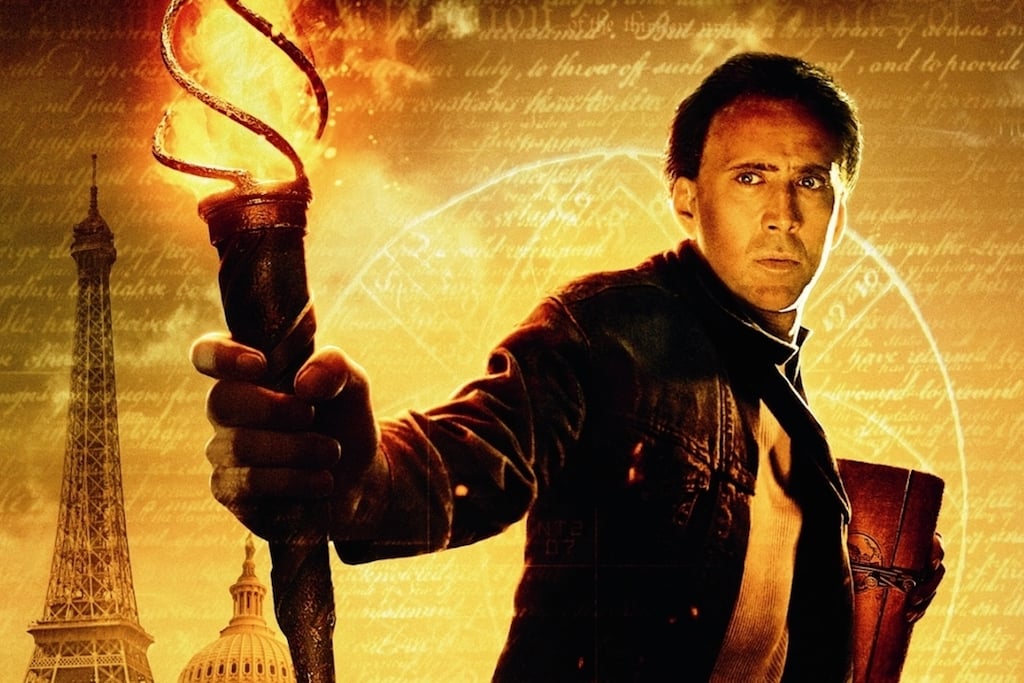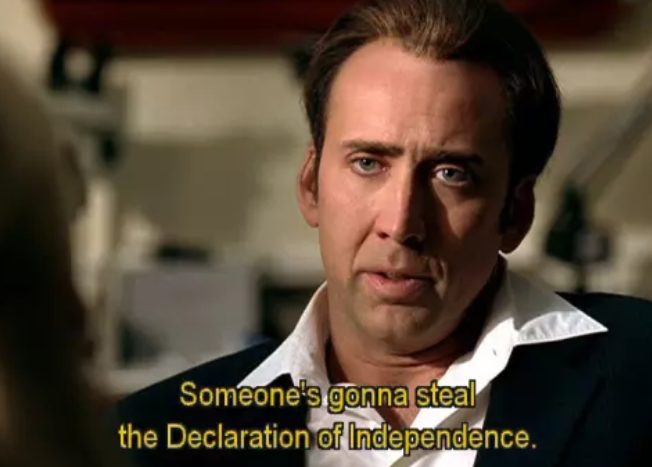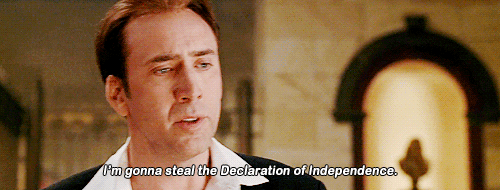In Defence Of ‘National Treasure’: One Of The Best (And Dumbest) Adventure Films Ever Made
All hail Benjamin Franklin Gates.

When it was released in 2004, National Treasure received a grossly underwhelming response from critics.
Slammed by most reviewers, the film was unfairly labelled as derivative. Empire called it a “rushed-out knock-off [of The Da Vinci Code]”, judging it “simultaneously moronic and mildly educational”. Rolling Stone, rating it just one out of five stars, said it possessed a “robotic cheerlessness” and called it a “paycheck movie” for Nicolas Cage. Not to be outdone, USA Today dismissed National Treasure as a “tepid Indiana Jones knock-off” with a “flaccid execution and stupefying premise”.
Audiences didn’t care. The lowly 44 percent reviewer score on movie aggregator Rotten Tomatoes contrasts with a healthy 76 percent audience approval, and Google beats this with an 89 percent audience approval on its home-brand like-o-meter.
National Treasure 2: Book of Secrets, released in 2007, follows a similar theme. The sequel clocked a dismal 35 percent reviewer score on Rotten Tomatoes versus a whopping 89 percent audience rating on Google. The simple existence of National Treasure 2 highlights this critic/audience discrepancy; the first film performed well enough at the box office to warrant a return adventure. But the critics’ knives were out once more, with Empire labelling it a “humourless … turgid action sequel”.
There’s a lot more to the National Treasure series than its critical lambasting, and for many fans it’s seen as a classic, underrated gem. With a decade having passed since the last instalment, now seems like the perfect time to defend National Treasure with terminal intensity.
Goofy (And Knowing) Charm
Let’s revisit exactly what National Treasure is about. Nicolas Cage plays Benjamin Franklin Gates (no, really), renowned treasure hunter and conspiracy theorist who discovers there is a secret treasure map written in invisible ink on the back of the American Declaration of Independence (no, really). Double crossed by his adventuring partner Ian (played by ubiquitous rent-a-bastard Sean Bean), Ben and his assistant Riley (Justin Bartha) must stop the Declaration of Independence falling into Ian’s hands by stealing it themselves (honestly, this is the plot). They set out to locate the treasure with the help of expert historian Abigail Chase (Diane Kruger) and Ben’s dad Patrick (Jon Voight), who is himself a lapsed treasure hunter.
It’s probably fair to say that the film’s preposterous concept is the foundation of why so many are quick to dismiss National Treasure. When I first saw the trailer in the cinema, it was met with howls of derision from the audience. Having mentally made a note to avoid ever bothering my eyeballs with it, it was a huge surprise when I finally saw the movie and had a great time.
The thing is, this movie knows it is bonkers. The characters make a point of being embarrassed at discussing the possibility of an invisible map, and the movie has enough self-awareness to acknowledge that it is silly. All it’s asking of you is to get on board with it.


National Treasure yields exactly the right amount of fun and adventure that was missing in Indiana Jones and the Kingdom of the Crystal Skull — the very movie series it was accused of imitating. Where Spielberg and Lucas dragged poor Harrison Ford around one obvious jungle soundstage after another, the National Treasure movies got back to adventure basics and globe-trotted Paris, London, miscellaneous frozen wastelands, and Mount Rushmore. I know it doesn’t make sense, but Crystal Skull should really have been influenced by National Treasure.
If evidence is needed of National Treasure’s status as the Indy movie we deserved, then consider the parallels beyond the tomb raiding and treasure hunting. Aside from the fact that both National Treasure plots are classic Lucas-esque MacGuffin hunts, the father/son dynamic between Ben and Patrick is straight out of the Last Crusade playbook, with the younger man continuing the life’s work of the elder amid crotchety faux indifference and a begrudging passing of the torch. The movie even opens on a flashback transition, with Ben lifting his bowed head to return us to the present day, exactly like the opening of Last Crusade.
It has an earnestness that makes us care about the high stakes madness and bookish characters.
The National Treasure movies are part scavenger hunt, part heist movie and part history lesson. The premise might be ludicrous, and PG-rated adventure movies might not be the coolest genre around, but that doesn’t make it bad. You’ll be hard pressed to find another franchise that delightfully melds Goonies-style puzzles with the jovial crime capers of Ocean’s Eleven. It incorporates elaborate heist mechanics in order to pinch the Declaration in the first film, and infiltrate Buckingham Palace and the Oval Office in the second.
National Treasure has the sort of complex, multi-faceted capers the Mission Impossible series has been doing for years, but where Tom Cruise’s franchise feels increasingly sterile (each movie too standalone to feel part of a whole), Treasure has heart. It has an earnestness that makes us care about the high stakes madness and bookish characters.
At times, National Treasure almost feels like the wish fulfilment of a grown-up nerd, exorcising childhood demons by turning a history geek into an action movie hero. It’s stacked with geeky dialogue like, “I’m sorry I dropped you, I had to save the Declaration”. And even better, “I want to marry your brain”. The film tries to be educational, like a childhood learning aid masquerading as a fun toy. But the difference here is that National Treasure is legitimately fun, despite its best efforts to school you.
So Why Do People Hate It?
The negative critical reaction the the National Treasure franchise might have to do with the competition at the time of release. Dan Brown’s Da Vinci Code was published the year prior and was a massive success. It was all too easy (and somewhat lazy) to see National Treasure as a Da Vinci Code knock-off. A quick cash grab to ride the coattails of a popular phenomenon.
The Da Vinci Code movie followed in 2006 and would have likely been on the radar of most reviewers at the time. Likewise, when National Treasure 2: Book of Secrets was released, Indiana Jones and the Kingdom of the Crystal Skull was but one hotly anticipated year away, and another easy excuse with which to pass off the sequel.
Perhaps part of the issue is also with Cage — or at least people’s perceptions of him. This is a man who had morphed from being the by-word for method acting into a living meme. He has, on more than one occasion, chosen to ‘go big’, leading to some memorable, albeit eccentric, performances. These have, in turn, cast a shadow over his acting chops. And I say all this as a genuine Nic Cage fan.
As much as I love Face/Off and Con Air, sometimes going Full Cage makes us forget his browbeaten turn in John Dahl’s superlative noir Red Rock West. Or his portrayal of a broken alcoholic in Leaving Las Vegas. Or his performance as twins in Charlie Kaufman’s Adaptation. Or as an Elvis-obsessed hoodlum in David Lynch’s Wild at Heart.
It’s possible to (unfairly) assume the National Treasure movies fall into Cage’s later career bracket, where he seems to have adopted a quantity-over-quality approach. Equally unhelpful is Cage’s internet status, when all you need do is switch on a computer to see him as everything from an 18th-century vampire to a windscreen wiper decal.

Whatever the reasons for National Treasure’s under-appreciation, a reassessment ought to open the door to cult status. It is a perfect film for summer outdoor cinemas or fleapit retrospectives, while we wait (hope) for National Treasure 3, which has been on the cards since forever.
Fact-checking is cited as the reason for the sloth-like progress, and I’ll wager there aren’t too many other Nic Cage movies getting delayed because of their factual diligence or historical rigour. But it does seem strangely apt, like something even Benjamin Franklin Gates would approve of.
–
Adam Fleet is a film nerd, comic book enthusiast, punk rocker. He also writes for The Reel Word, writes short fiction and tweets at @adamfleetmovies.